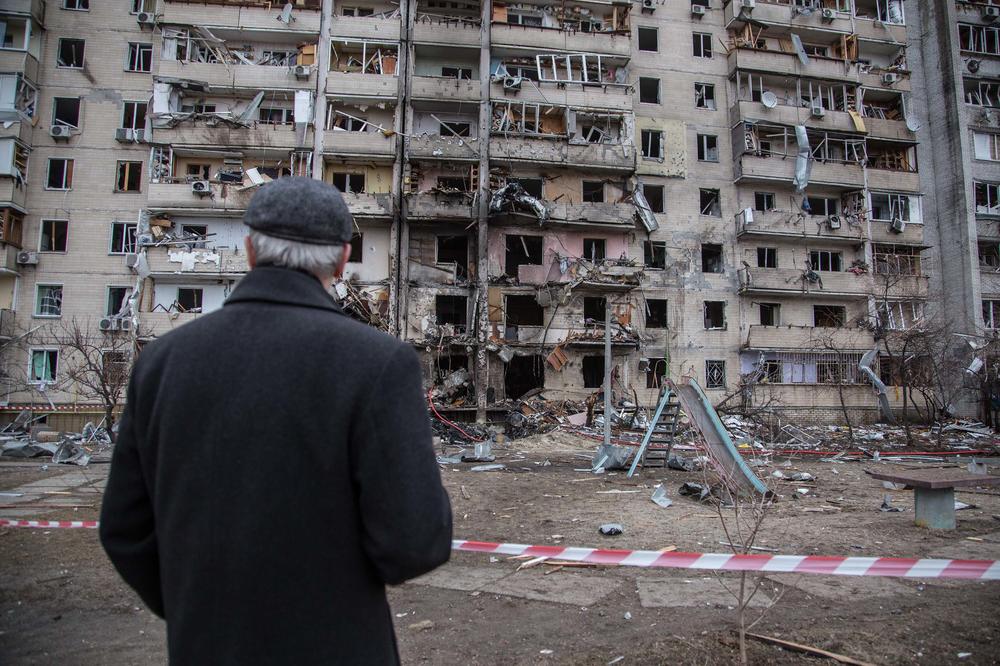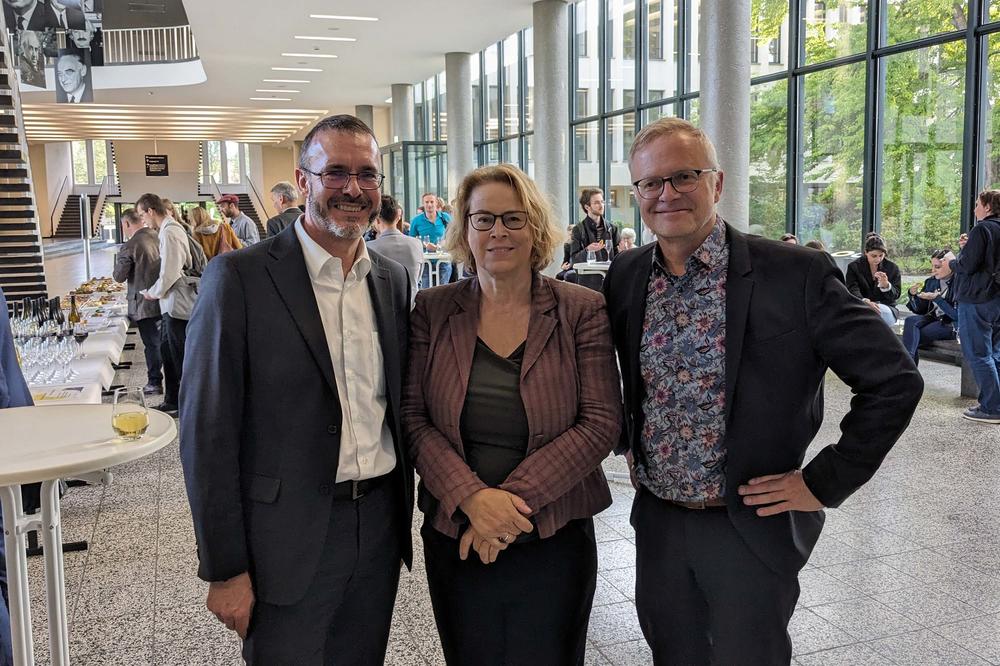Reconstruction during Wartime
Jaco Cilliers heads the United Nations Development Programme in Ukraine. He recently gave a talk at Freie Universität Berlin on the program’s work, even as war continues
Jul 15, 2024
Ukraine under attack: View of an apartment building in Kyiv, which was damaged in a Russian attack.
Image Credit: Oleksandr Ratushniak / UNDP Ukraine
The head of the United Nations Development Programme (UNDP) in Ukraine, Jaco Cilliers, gave a lecture at Freie Universität Berlin in which he addressed the challenges and importance of reconstruction in Ukraine in light of the ongoing, widespread devastation wrought upon the country by Russia’s invasion. The talk took place as part of Cilliers’ visit to Germany to attend the third Ukraine Recovery Conference in Berlin on June 11 and 12, 2024. Cilliers was a member of the UNDP delegation led by UNDP Administrator Achim Steiner. The conference was hosted by Ukraine’s President Volodymyr Zelenskyy and Germany’s Chancellor Olaf Scholz. The lecture also served as the opening event for the “Rebuilding Ukraine – The Social Dimension” workshop organized by the Institute for East European Studies at Freie Universität Berlin in cooperation with the Virtual Ukraine Institute for Advanced Study and European University Viadrina in Frankfurt am Oder.
Numbers are one way to give people a sense of the consequences of Russia’s war against Ukraine. More than ten million people had to leave their homes; two thirds of them are abroad. The rate of poverty rose drastically, within one year increasing from five and one half percent to almost one fourth of the total population. During the same period the economy collapsed, and almost one third of all jobs disappeared. According to a study by the World Bank with support from the UNDP, reconstruction will cost 486 billion US dollars.
Is Sustainable Development Possible while War Continues?
It is a huge undertaking that can only be accomplished with international support. To this end, a two-day conference devoted to the reconstruction of Ukraine was held in Berlin in June, with representatives from more than seventy countries in attendance. Jaco Cilliers was one of them. A native of South Africa, Cilliers has been the Resident Representative of the UNDP in Ukraine since late 2022. After the conference Cilliers gave a lecture at Freie Universität Berlin, where he reported on the reconstruction efforts. He said, “The conference really shows the solidarity of the rest of the world with the plight of Ukraine. It reconfirms that.”
The UNDP has been working in Ukraine since 1993. Currently, 439 staff members are working in numerous UNDP offices across Ukraine. More than 90 percent of them are Ukrainians. Their work helps to repair war damage; they have removed hundreds of thousands of tons of rubble from destroyed buildings and have surveyed a huge area for mines and unexploded bombs.
Jaco Cilliers (UNDP Resident Representative in Ukraine), Professor Katharina Bluhm (dean of research at the Institute for East European Studies, Freie Universität), and Herbert Grieshop (director of Freie Universität Berlin’s International Office)
Image Credit: Jonas Huggins
The aid, however, is not only intended to provide emergency relief, but also to facilitate long-term sustainable development. “Development and recovery never stop, even in times of war,” said Cilliers. The UNDP continues to actively pursue the United Nations’ goals for sustainable development. Cilliers named five categories for the individual projects of the UNDP: crisis response, reconstruction for recovery and return, public services, inclusive economic growth, and social cohesion and inclusion.
One major focus is on digitization. Ukrainian society has already made considerable progress in that area. Cilliers noted, for example, that practically all the stores and shops in Ukraine accept digital payment as a matter of course. The UNDP is now supporting administrative offices to provide digital services and make them available to people from the occupied territories, regardless of where they happen to be now. UNDP staff members scanned documents that were able to be salvaged from the archives of the Donetsk and Luhansk regions before the Russian occupiers could take over control of them, including birth certificates, death certificates, and name changes.
Few Funds for “Soft” Infrastructure
The UNDP’s work is not easy. For one thing, despite widespread international solidarity, resources are limited. Cilliers points out that it is still relatively easy to obtain funding for so-called “hard” infrastructure: things that you can see and touch, such as child care centers and residential buildings. It is more difficult to raise money for things with abstract value, such as good administration, social services, the rule of law, or the protection of human rights. The UNDP supports, for example, the reintegration of war veterans in civil life as well as free legal advice. “Unfortunately, the least amounts of funding we have are in these important areas,” said Cilliers.
In addition, the ongoing war presents not only physical dangers, but also mental health issues. According to Cilliers, the mental health impact is severe. Ten million Ukrainians, including many children, are currently at risk of developing post-traumatic stress disorder. In a survey of the 3000 employees of all the UN organizations in Ukraine, almost half reported that they were suffering under a stress disorder. Everyone knows people who have died. “The war might not be in the whole of Ukraine,” said Cilliers. “It’s mostly confined to the East, but everybody is affected.”
The original German version of this article appeared in campus.leben, the online magazine published by Freie Universität Berlin.
Further Information
Lecture Was Part of the International Week at Freie Universität Berlin
The workshop “Rebuilding Ukraine – The Social Dimension” held by the Institute for East European Studies at Freie Universität Berlin and the lecture by Jaco Cilliers were part of the International Week, which is held annually at Freie Universität. In honor of the seventy-fifth anniversary of Freie Universität’s International Office, this year’s international week was boosted to XXL size with events spread over the entire month of June.
Students, researchers, and staff members of Freie Universität were invited to attend various events to learn about the university’s current international activities, country-specific cooperation programs, offerings designed for international students, or funding programs. Almost fifty lectures and workshops as well as several get-togethers were held to provide information and opportunities for exchange.
Relations of Freie Universität with Russia and Eastern Europe
In response to the Russian invasion of Ukraine in February 2022, Freie Universität Berlin suspended its relations with academic institutions in Russia. All its collaborative activities with academic institutions in Russia have been on hold since then. This includes student exchanges and the strategic partnership with the University in Saint Petersburg. Freie Universität’s Liaison Office in Moscow was closed and moved to the Georgian capital Tbilisi.
Freie Universität is committed to helping at-risk researchers from Ukraine who had to leave their homes. The university set up a program for short-term research grants, including so-called remote grants for Ukrainians who had to continue their work at another Ukrainian partner institution. More than fifty individuals received them. Most of those who did research at Freie Universität were at the Friedrich Meinecke Institute of History and the Institute for East European Studies. In addition, Freie Universität now offers more language classes for refugee students, which are attended by many students from Ukraine. After the war began, Freie Universität started establishing more collaborative relations with universities in Ukraine and Eastern Europe.


